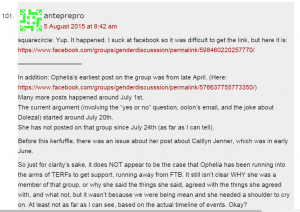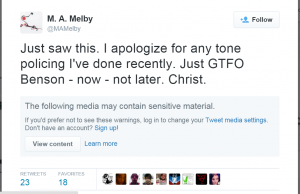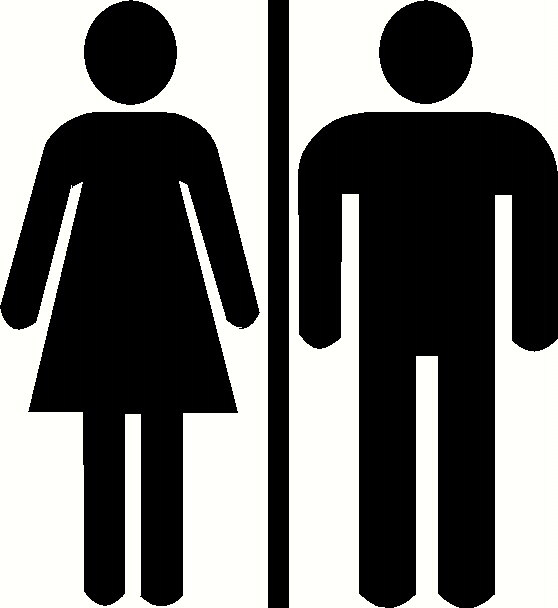In this post back in November 2010, I quoted from a Wall Street Journal article about Ben Barres, formerly Barbara.
The top science and math student in her New Jersey high school, she was advised by her guidance counselor to go to a local college rather than apply to MIT. She applied anyway and was admitted. As an MIT undergraduate, Barbara was one of the only women in a large math class, and the only student to solve a particularly tough problem. The professor “told me my boyfriend must have solved it for me,” recalls Prof. Barres…
Although Barbara Barres was a top student at MIT, “nearly every lab head I asked refused to let me do my thesis research” with him, Prof. Barres says. “Most of my male friends had their first choice of labs. And I am still disappointed about the prestigious fellowship I lost to a male student when I was a Ph.D. student,” even though the rival had published one prominent paper and she had six.
Then she became Ben, and all was different. Whaddya know.
Some supporters of the Summers Hypothesis suggest that temperament, not ability, holds women back in science: They are innately less competitive. Prof. Barres’s experience suggests that if women are less competitive, it is not because of anything innate but because that trait has been beaten out of them.
“Female scientists who are competitive or assertive are generally ostracized by their male colleagues,” he says.
In addition to being told their boyfriends must have solved that difficult math problem for them.
From May that same year (2010), Shankar Vedantam in the Sydney Morning Herald on Ben Barres and Joan Roughgarden (formerly Jonathan):
MADELINE Heilman at New York University once conducted an experiment in which she told volunteers about a manager. Some were told, “Subordinates have often described Andrea as someone who is tough yet outgoing and personable. She is known to reward individual contributions and has worked hard to maximise employees’ creativity.”
Other volunteers were told, “Subordinates have often described James as someone who is tough yet outgoing and personable. He is known to reward individual contributions and has worked hard to maximise employees’ creativity.”
The only difference between what the groups were told was that some people thought they were hearing about a leader named Andrea while others thought they were hearing about a leader named James. Heilman asked her volunteers to estimate how likeable Andrea and James were as people. Three-quarters thought James was more likeable than Andrea.
Cordelia Fine cites study after study like that in Delusions of Gender.
Bias is much harder to demonstrate scientifically in real life, which may be why large numbers of people do not believe that sexism and other forms of prejudice still exist. Many people think we live in a “post-racial” and “post-sexist” world where egalitarian notions are the norm. Indeed, if you go by what people report, we do live in a bias-free world, because most people report feeling no prejudice whatsoever.
What would be remarkably instructive in real life would be if women in various professions could experience life as men, and vice versa. If the same person got treated differently, we would be sure sexism was at work, because the only thing that changed was the sex of the individual and not his or her skills, talent, knowledge, experience, or interests.
And this is where Roughgarden and Barres come in.
Joan Roughgarden and Ben Barres are biologists at Stanford University. Both are researchers at one of the premier academic institutions in the country; both are tenured professors. Both are transgendered people. Stanford has been a welcoming home for these scientists; if you are going to be a transgendered person anywhere in the United States, it would be difficult to imagine a place more tolerant than Palo Alto and the San Francisco Bay Area.
Ben Barres did not transition to being a man until he was 50. For much of her early life, Barbara Barres was oblivious to questions of sexism. She would hear Gloria Steinem and other feminists talk about discrimination and wonder, “What’s their problem?” She was no activist; all she wanted was to be a scientist. She was an excellent student. When a school guidance counsellor advised her to set her sights lower than MIT, Barbara ignored him, applied to MIT, and got admitted in 1972.
Yay! No sexism apart from the guidance counsellor)! Sexism is so over!
During a particularly difficult maths seminar at MIT, a professor handed out a quiz with five problems. He gave out the test at 9am, and students had to hand in their answers by midnight. The first four problems were easy, and Barbara knocked them off in short order. But the fifth one was a beauty; it involved writing a computer program where the solution required the program to generate a partial answer, and then loop around to the start in a recursive fashion.
“I remember when the professor handed back the exams, he made this announcement that there were five problems but no one had solved the fifth problem and therefore he only scored the class on the four problems,” Ben recalled. “I got an A. I went to the professor and I said, ‘I solved it.’ He looked at me and he had a look of disdain in his eyes, and he said, ‘You must have had your boyfriend solve it.’ To me, the most amazing thing is that I was indignant. I walked away. I didn’t know what to say. He was in essence accusing me of cheating. I was incensed by that. It did not occur to me for years and years that that was sexism.”
And then Barbara became Ben and things changed, and Ben couldn’t help noticing.
Ben also noticed he was treated differently in the everyday world. “When I go into stores, I notice I am much more likely to be attended to. They come up to me and say, ‘Yes, sir? Can I help you, sir?’ I have had the thought a million times, I am taken more seriously.”
When former Harvard president Larry Summers (who went on to become a senior economic adviser to President Barack Obama) set off a firestorm a few years ago after musing about whether there were fewer women professors in the top ranks of science because of innate differences between men and women, Ben wrote an anguished essay in the journal Nature. He asked whether innate differences or subtle biases – from grade school to graduate school – explained the large disparities between men and women in the highest reaches of science.
“When it comes to bias, it seems that the desire to believe in a meritocracy is so powerful that until a person has experienced sufficient career-harming bias themselves they simply do not believe it exists … By far, the main difference that I have noticed is that people who don’t know I am transgendered treat me with much more respect: I can even complete a whole sentence without being interrupted by a man.”
Joan Roughgarden did it in the other direction, and found the reverse difference.
She challenged prevailing views on sexual selection, and was surprised by some of the responses.
THE scientific establishment, Joan said, was livid. But in contrast to the response to her earlier theory about tide pools and marine animals, few scientists engaged with her. At a workshop at Loyola University, a scientist “lost it” and started screaming at her for being irresponsible. “I had never had experiences of anyone trying to coerce me in this physically intimidating way,” she said, as she compared the reactions to her work before and after she became a woman. “You really think this guy is really going to come over and hit you.”
At a meeting of the Ecological Society of America in Minneapolis, Joan said, a prominent expert jumped up on the stage after her talk and started shouting at her. Once every month or two, she said, ”I will have some man shout at me, try to physically coerce me into stopping …When I was doing the marine ecology work, they did not try to physically intimidate me and say, ‘You have not read all the literature.’
“They would not assume they were smarter. The current crop of objectors assumes they are smarter.”
…
I asked her about interpersonal dynamics before and after her transition. “You get interrupted when you are talking, you can’t command attention, but above all you can’t frame the issues,” she said. With a touch of wistfulness, she compared herself to Ben Barres. “Ben has migrated into the centre whereas I have had to migrate into the periphery.”
Interesting, isn’t it.






